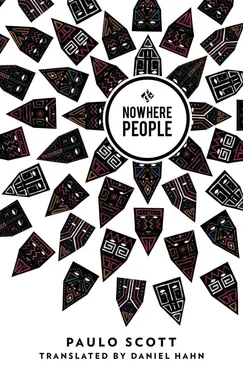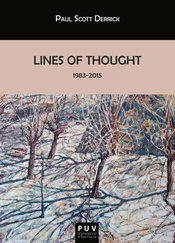Paulo felt like he’d been duped. On Monday afternoon he had to be at the law firm where he was doing an internship. He considered for a few moments — there’s nothing that needs doing that can’t wait till Wednesday (he’ll phone to let them know that he’ll only come in to work on Wednesday). He let Manoela keep talking until he interrupted. ‘I don’t have anywhere to stay Sunday night or Monday night.’ She smiled (smiling is part of the process by which she senses an opportunity appearing). ‘We’re in the best hotel in Pelotas,’ she said snobbishly. ‘Space won’t be a problem. The lighting guy’s room was vacated yesterday, the nights have already been paid for, it’s all settled. You needn’t worry, you can take his place … and I’ve got to say, you’re in luck: the son of a bitch bagged himself the best room of all.’ The truth was, he loved watching her in action, doing whatever she wanted to make her plans happen right away, even when he was the victim. They exchanged small talk, they joined the people shaking frantically on the dance floor. He considered making a move on her, putting his arms round her waist, pushing things a bit just to see where it might go, but there was no point. Manoela had always been out of his league, she always would be. And as a song came to an end, in a blasé tone of voice that made him feel confusingly mature, rather like Manoela herself, he said I’m going to go for that walk now, Manu, she stroked his face affectionately, and each went their own way. He got a beer from the pantry, struck up a conversation with a girl who looked just like the actress Malu Mader and who seemed to have had too much to drink. This pretend Malu, who was really Ana Cristina something-or-other, said some nonsense that really annoyed him; all the same they walked together to a party that was happening two blocks from the hotel and where to his misfortune they were only serving a sweet red wine. He lied about having already graduated and said that he was travelling to Cuba in a few weeks and then to Spain and Portugal to do a master’s in comparative law at Coimbra. Lying, lying out of spite, was what the situation called for, it was the only way to be affectionate, responsive. Even though she was pretty out of it, she said that she so loved his
dynamism , and he kissed her unenthusiastically (her resemblance to the goddess Malu Mader was not close enough). Then he listened to her country-girl inanities until he was convinced that it would be better to get back to his accommodation once and for all and make sure he was in a suitable physical condition for the following morning’s debates. Contrary to his expectations, the Sunday debates were worse than Saturday’s. He didn’t stay for the end. He had no qualms about slipping away early, his fuck-it switch was activated; in his mess of a life nothing would go back to the way it used to be. He wanted madness, impetuosity — like he found in all those French writers he read, in the English bands from the sixties, Spanish comic books, the rhythmic ferocity of rap, the words and attitudes that should be current and brilliant, endless and impossible. He rushed to reach Pelotas before it got dark. The hotel and the room were indeed very nice, and on Monday — after finally managing to park his car in the guest car park which had, according to the manager, been full all weekend because of the National Festival of Desserts — spent his day wandering the city’s streets and squares and around half past six in the evening went into Aquários, the café-diner on the corner of Quinze de Novembro and Sete de Setembro, for an espresso. The counter, the tables, all occupied. He thought about turning around, yet instinct made him walk over to the table by the side door, where a teenage girl with short black hair wearing glasses with funny white frames was busy reading an issue of
DUNDUM magazine (what girl from the interior would be sitting blithely reading
DUNDUM in this place, the absolute domain of middle-aged men?). He approached, asked if he might sit down, she threw him a suspicious glance, said nothing, he assured her he wouldn’t take up more than a few inches of the table, explained that he had been walking all day and wouldn’t be able to enjoy his coffee if he had to drink it standing up. She nodded, making no effort to hide her surprise at the sheer nerve of this guy, he thanked her and seeing that her cup was empty asked whether he could buy her a drink, she said she’d have a tea. It was easy enough for them to start up a conversation that would reveal her name, Angélica, and her odd, ironic, rude, dry sense of humour. They talked mainly about poetry (she was much more comfortable on this subject than he was). At a certain point in the conversation she took a spiral-bound exercise book from her bag, the kind that schoolchildren use. She didn’t make any fuss, just opened it at a page near the middle and (after giving him a meaningful stare) began to draw him. Paulo didn’t want to ask, didn’t want to interfere, he kept talking. She finished the drawing, closed the exercise book, put it down on the table. Even after other tables had become free and the activity in the café had thinned out, they remained sitting there together till the place closed, at which point they paid the bill and left. The moment they set foot on the pavement, Angélica handed him the exercise book, said that he would be part of a new game which one of her school friends had made up and that she’d thought was really cool. ‘You get an ordinary exercise book, like this one, you find someone you like a lot, you draw that person as best you can, then you give it to them, on condition that they’ll write something on the following page and, without waiting too long, a week at most, they then pass it on to someone else, who passes it on to someone else and so on. I’m not sure I’ve explained it clearly. Have I?’ He said it was a bit like a promissory note to the bearer, a promissory note that would never be paid and, as soon as she was done smiling, he asked whether he was allowed to believe that she liked him a lot. She took a cigarette out of her bag and shrugged just the way someone old and weary of life would shrug after revealing their affection for someone who wasn’t expecting it (or who didn’t deserve it, but it happened anyway). She changed the subject. ‘There are some poems I wrote in the first dozen pages.’ He didn’t wait, he tried to give her the kind of hug a friend would give her but she moved away saying, frowning, that she was really late for a family engagement, before turning her back on him sharply and walking off towards Praça Coronel Osório. He went back to the hotel, opened a few cans of beer, and spent the rest of the night reading and re-reading what was written in the exercise book. Then on Tuesday morning (as soon as the actors had released the costumes) he took all the various bags they handed him, folded down the back seat of the Beetle, arranged the luggage, covered it with a dark grey cloth that Manoela had insisted on giving him, stressing how useful it would be in stopping all that gear from attracting the attention of the highway police, and, just minutes before it started raining, he, Paulo, turned right onto the BR-116 towards Porto Alegre. And at Cerro Grande, even with the limited visibility due to the rain that had now become a storm, he saw a shape, a person crouching by the side of the left-hand lane. He braked without stopping completely. It was a little Indian girl holding a pile of newspapers and magazines to her chest. Beside her, two white plastic bags on the ground. He lowered the car window and let his gaze rest on her, wondering, struck by the sight of her, how far she’d have to walk to find somewhere dry where she could take shelter (the closest indigenous villages were kilometres away). He looked in his rear-view mirror. Behind him: the deserted road. And, now looking back at her over his shoulder (the car moving at less than ten kilometres an hour), he thought about stopping, but he did not.
Читать дальше












